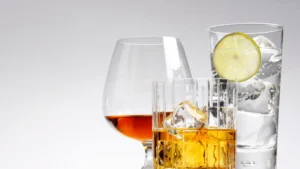Introduction
Alcohol consumption has been a part of human civilization for centuries. While moderate drinking may have some health benefits, such as reduced risk of heart disease, excessive alcohol intake can lead to various health issues. One of the most debated topics is whether consuming alcohol causes cancer. In this article, we will explore the relationship between alcohol and cancer, with a focus on the impact on the kidneys, the general health risks, when to seek medical advice, and a summary of the key points.

Alcohol and the Kidneys
The kidneys are vital organs responsible for filtering waste products and toxins from the blood. Heavy and prolonged alcohol consumption can damage the kidneys, leading to a condition called alcoholic kidney disease. This disease impairs the kidneys’ ability to function properly, which can result in a buildup of waste products and fluid imbalances in the body. Consequently, chronic alcohol abuse increases the risk of kidney cancer.
Moreover, excessive alcohol consumption is associated with other kidney-related conditions such as kidney stones and urinary tract infections. These conditions, although not directly linked to cancer, can cause discomfort and further increase the risk of developing kidney diseases.
Health Risks of Alcohol
Besides the impact on the kidneys, consuming alcohol excessively has several other health risks that can contribute to the development of cancer. Alcohol is classified as a carcinogen by the International Agency for Research on Cancer (IARC) due to its association with various types of cancer. These include but are not limited to mouth, throat, esophageal, liver, colorectal, and breast cancer.
The risk of developing cancer depends on the amount of alcohol consumed. The risk increases significantly with heavy and prolonged drinking. The underlying mechanisms by which alcohol induces cancer involve acetaldehyde, a toxic byproduct of alcohol metabolism. Acetaldehyde damages DNA and proteins, interfering with cell functions and promoting the development of cancerous cells.
Additionally, excessive alcohol intake can weaken the immune system, making it less able to fight off cancer cells and other diseases. Alcohol abuse also contributes to inflammation in the body, which is a known factor in cancer development.
When to Contact a Doctor
If you are concerned about your alcohol consumption and the potential risk of cancer or kidney diseases, it is crucial to seek medical advice. Experienced healthcare professionals can assess your habits, provide guidance, and recommend appropriate screening tests to monitor your health. If you have a family history of cancer or kidney diseases, it is essential to discuss this with your doctor to establish a tailored prevention plan.
It is important to remember that responsible drinking, moderation, and informed decisions are key to reducing health risks. Avoiding excessive alcohol intake, drinking in moderation, and developing a healthy lifestyle overall are essential steps towards maintaining your well-being and reducing the risk of cancer and other health issues.
Summary
Alcohol consumption, particularly excessive and prolonged drinking, increases the risk of cancer development, including kidney cancer. The kidneys are susceptible to damage from alcoholic kidney disease, which can impair their function. Besides the impact on the kidneys, alcohol abuse is associated with various types of cancer due to its carcinogenic properties. Seeking medical advice is crucial if you are concerned about your alcohol consumption and its potential health risks. It is essential to strive for moderation and informed decisions when it comes to alcohol to maintain a healthy lifestyle and minimize the risk of cancer and other health issues.
References:
- International Agency for Research on Cancer (IARC). (2021). Alcohol and Cancer. World Health Organization. Retrieved from [link to the official IARC page on alcohol and cancer].
Additional Reading:
- American Cancer Society. (2021). Can drinking alcohol increase your cancer risk? American Cancer Society. Retrieved from [link to the official American Cancer Society page on alcohol and cancer risk].
- National Kidney Foundation. (n.d.). Alcohol and Your Kidneys. National Kidney Foundation. Retrieved from [link to the official National Kidney Foundation page on alcohol and kidney health].
Author’s Note:
The information provided in this article is intended for educational purposes only and should not replace professional medical advice. If you have concerns about alcohol consumption, cancer, or kidney health, please consult a healthcare professional.
Conclusion
While alcohol consumption can have some health benefits in moderation, excessive and prolonged drinking poses significant risks to our health, including an increased risk of cancer. The impact of alcohol on the kidneys and its association with kidney cancer highlight the importance of responsible drinking. The toxic byproduct of alcohol metabolism, acetaldehyde, and the immune-weakening effects of alcohol contribute to the development of various types of cancer. It is essential to seek medical advice and adopt healthy lifestyle choices to reduce the risk of cancer and other alcohol-related health issues. By making informed decisions and striving for moderation, we can safeguard our well-being and potentially prevent the occurrence of alcohol-related cancers.